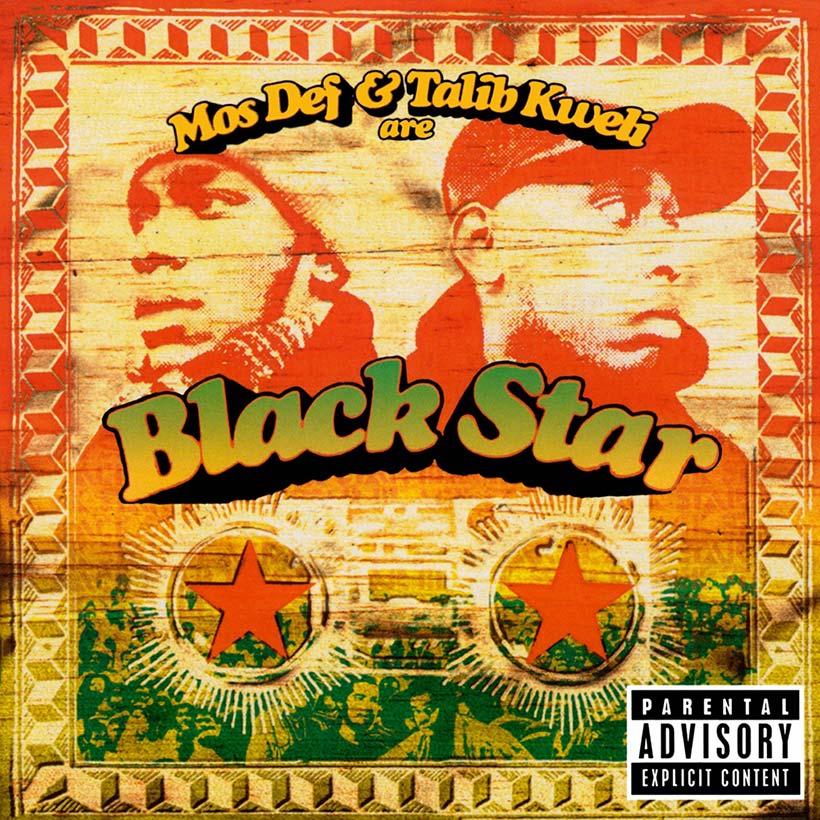
Hip-hop tends to write about itself, to be thinking about what’s going on within its own community, and Black Star were no exception, though instead of focusing on the gangsta style that had tended to rule the 90s, they took their lead from the likes of Boogie Down Productions: artists who went from being Criminal Minded to delivering Edutainment, a path doubtless partly shaped by the slaying of one half of the group, Scott La Rock. Black Star was focused on what it meant to be an African-American in the world at that time. Even their name was a statement: Black Star was the shipping line launched by Marcus Garvey, the Jamaican campaigning politician whose pan-African philosophy inspired the Rastafarian movement.
Listen to Mos Def And Talib Kweli Are Black Star right now.
Both MCs were known to the hip-hop community before they formed Black Star. Mos Def had guested on tracks by Da Bush Babees and De La Soul in 1996; Talib Kweli worked on an album by Mood and teamed up with DJ Hi-Tek in Reflection Eternal. He called on Hi-Tek when Black Star were seeking a producer for their album. Their first release together was “Definition,” a single that set out their stall both as great MCs and as a duo concerned about what had become of hip-hop. “Stop acting like a b—h already, be a visionary,” demands Kweli. “It ain’t about production… what else we discussin’?” says Mos Def. Both felt the message was getting lost in the music. The track was wonderful, worthy of its place as one of the pivotal tracks on a truly powerful album, and was immediately followed by more thoughts on the topic in “RE:DEFinition.” And that was just the start.
“Children’s Story,” inspired by a Slick Rick ditty of the same name, is a downbeat tale of a rapper selling out, a bloody end being the inevitable conclusion. “Brown Skin Lady,” sampling a mellow Gil Scott-Heron tune, finds Mos Def, chatting ragga, taking a lead from Kweli’s opening verse, which references dancehall MC Tony Rebel’s “Fresh Vegetable” 45. “B Boys Will B Boys” is far more upbeat and upfront, talking about Bambaataa’s Zulu Nation and rewinding to the days of hip-hop as a party-going youth, carefree and with only optimism in its soul.
The six-minute “Respiration,” with Common delivering the third verse, makes the extent of these MCs’ talents clear. It’s a gripping – in fact mesmerizing – tour of urban reality in Brooklyn, with more detail than most large-scale maps. “Thieves In The Night” asks who is the oppressor here: us or them? And if it’s us, is that because we’re doing it at some other oppressor’s bidding, or is it our own weakness?
These are deep questions in any field of endeavor, never mind from two guys effectively starting their journey in music. And so the album goes on, diverse yet cohesive, confident yet doubting, mellow yet hard-hitting, smiling yet sad, detailing the worst and finding positivity in it. Mos Def And Talib Kweli Are Black Star hit the shelves on September 28, 1998. Was it the best hip-hop album of its decade? That’s saying a lot. The best of its year? Probably.
Mos Def And Talib Kweli Are Black Star can be bought here.
source https://www.udiscovermusic.com/stories/rediscover-mos-def-and-talib-kweli-are-black-star/

